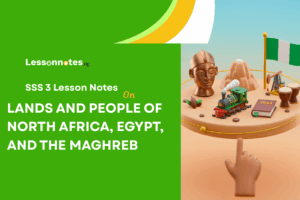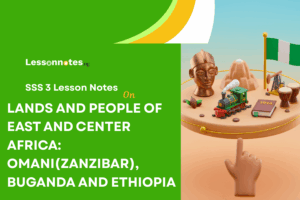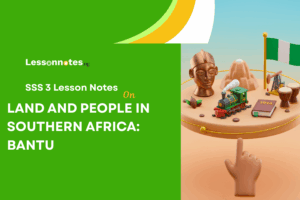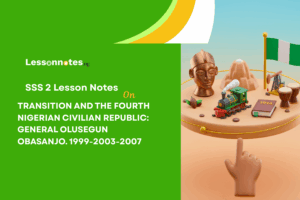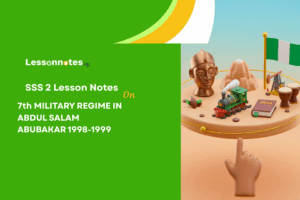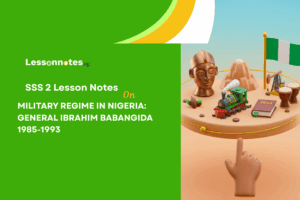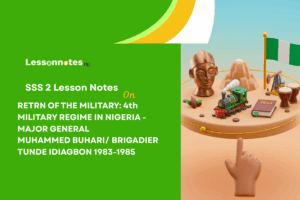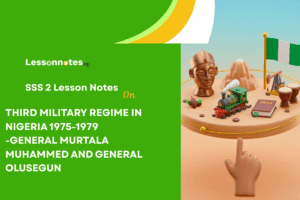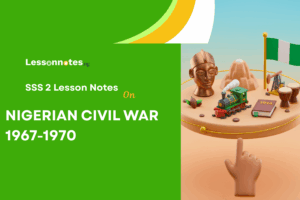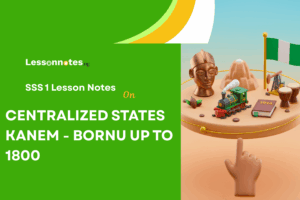THE EFIK SS1 Nigerian History Lesson Note
Download Lesson NoteTopic: THE EFIK
The Efik people are an important ethnic group in Nigeria. They live mainly in the south-south part of Nigeria, especially in Cross River State. Their main city is Calabar, which has been an important place for trade and culture for many centuries. The Efik have a rich history, interesting traditions, and played an important role in Nigeria’s past. This lesson will help us learn about who the Efik people are, where they came from, how they lived, what they believed, and why they are important in Nigerian history.
Origins and Early History
Who Are the Efik?
The Efik are a distinct group of people with their own identity:
- They speak the Efik language, which belongs to the Cross River language family
- They are related to nearby groups like the Ibibio, Annang, and Oron
- Sometimes these groups together are called the “Calabar people”
- They live mainly around the Cross River and its branches
- Their traditional homeland is in and around the city of Calabar
- Today, there are about 3-4 million Efik people
- They are known for their rich culture, food, and trading skills
- They have a long history of contact with Europeans
- Many Efik people are now spread across Nigeria and other countries
Where Did They Come From?
There are different stories about the origins of the Efik:
- Most stories say they moved from Ibibio areas to their present location
- Some say they originally came from the Igbo region
- Others believe they came from the Cameroon mountains
- They likely moved to find better places for fishing and trading
- They first settled at Creek Town (called Obutong in Efik language)
- Later they created other settlements like Duke Town (Atakpa) and Henshaw Town (Nsidung)
- These towns together formed what Europeans called “Old Calabar”
- They probably moved to this area in the 1500s and 1600s
- They traveled in family groups led by family heads
- They chose to live near the Cross River because it was good for trade
Early Settlements
The Efik built several important towns:
- Creek Town was one of the first Efik settlements
- Duke Town became a major center later
- Henshaw Town was another important community
- All these towns were built near the Cross River
- This location gave them access to trade routes going inland
- Being near the ocean let them trade with European ships
- They built their towns in places that were easy to defend
- Houses were made from wood, palm leaves, and other local materials
- Towns grew around family compounds
- Eventually these towns joined together as the Old Calabar federation
Political and Social Organization
The Ekpe Society
A special secret society played a big role in how the Efik governed themselves:
- The Ekpe society (also called Mgbe) was very powerful
- It was the main way the Efik governed their communities
- Only men who had been initiated could join
- There were different levels of membership
- To join the higher levels, a person had to pay a lot of money
- Members used a secret language and special symbols
- The society made and enforced laws
- It controlled trade and markets
- It had both political and religious duties
- Its main symbol was the leopard
The Obong of Calabar
The Efik had a traditional ruler with special powers:
- The ruler was called the Obong of Calabar
- This position grew from the leaders of trading houses
- At first, each town had its own chief
- Later, they united under one overall ruler
- The Obong was chosen from royal families
- The selection involved special ceremonies
- The Obong served as the main leader of the Efik
- He worked with a council of chiefs
- He represented the Efik people when dealing with outsiders
- The position of Obong still exists today and is respected
The House System
Efik society was organized around trading houses:
- Each “house” (ufok) was like a big extended family
- It was led by a head called an etubom
- The house worked as both a family and a business
- Houses controlled trade and gathered wealth
- Different houses competed for status and power
- New houses could form when members split from existing ones
- Houses owned slaves who worked for the family
- Important houses included Duke, Henshaw, Cobham, and Eyamba houses
- This system was the foundation of Efik society
- Each house controlled specific areas within Calabar
Family and Social Classes
The Efik had clear family structures and social divisions:
- The family was the basic unit of society
- Extended families lived together in compounds
- Men could have multiple wives, especially if they were wealthy
- Children belonged to their father’s family line
- Elders were highly respected
- Society had different classes:
- Ruling families at the top
- Wealthy traders formed the upper class
- Ordinary free citizens were in the middle
- Servants and slaves were at the bottom
- Slaves were often people captured from inland areas
- Some slaves could gain freedom and status over time
- A person could improve their position through trade or marriage
- Women’s status usually came from their father or husband
- Children were raised with strict discipline and respect for elders
Economic Activities
Trading Traditions
Trade was the main source of Efik wealth and power:
- The Efik lived at a strategic location between the inland and the coast
- They became middlemen in trade networks
- At first, they traded fish, salt, and local goods
- Later, they became intermediaries in European trade
- They controlled access to markets in the interior
- They developed sophisticated trading practices
- They used cowrie shells and brass rods as money
- They created trading networks with neighboring peoples
- They formed business partnerships with European merchants
- Their trading success gave them political power
The Slave Trade
For a long time, the slave trade was important to the Efik economy:
- They began trading slaves with Europeans in the 1600s
- They were middlemen rather than slave raiders
- They bought captives from groups living inland
- They sold these captives to European ships anchored at Calabar
- Old Calabar became a major port for the slave trade
- Trading houses competed for this profitable business
- They used the profits to buy luxury goods and weapons
- Some Efik houses became extremely wealthy from this trade
- The trade declined in the early 1800s when Britain banned slavery
- This trade had lasting effects on Efik society and economy
The Palm Oil Trade
After the slave trade ended, a new trade became important:
- Palm oil replaced slaves as the main export by the mid-1800s
- Europeans used palm oil for soap, machine oil, and food
- Efik traders collected oil from producers living inland
- They transported it to European ships using canoes
- They traded it for imported goods like cloth, guns, and alcohol
- This trade created great wealth for Efik trading houses
- It helped the Efik maintain their economic power during colonial times
- They built business relationships with European companies
- The trade required new business skills and networks
- Some areas developed palm plantations to produce more oil
Fishing and Farming
Traditional activities remained important:
- Fishing in the Cross River and smaller streams
- Using canoes and various fishing methods
- Preserving fish by smoking and drying it
- Growing crops like yams, cassava, and vegetables
- Cultivating oil palm trees for local use and trade
- Keeping some animals, mainly goats and chickens
- Hunting in nearby forests
- Gathering useful plants from the forest
- These activities provided basic food for families
- Extra products were traded locally and regionally
Crafts and Skills
The Efik developed many specialized crafts:
- Building canoes for transportation and fishing
- Carving wood for masks, tools, and household items
- Weaving baskets from local fibers
- Making pottery for storage and cooking
- Weaving and dyeing cloth
- Making mats for sleeping and sitting
- Blacksmithing to create tools and weapons
- Processing palm oil
- These crafts were practiced alongside trading
- Some crafts were organized into specialized groups
Cultural and Religious Practices
Traditional Religion
Spiritual beliefs were very important in Efik life:
- Belief in a supreme god called Abasi
- Respect for ancestors who could affect daily life
- Belief in nature spirits associated with rivers, forests, and weather
- Use of charms and medicines for protection
- Divination to understand messages from the spirit world
- Priests and priestesses who communicated with spirits
- Sacred places and shrines throughout Efik territory
- Animal sacrifice for important ceremonies
- Spiritual explanations for illness and bad fortune
- Emphasis on keeping harmony with the spirit world
The Ekpe Masquerade
An important cultural and religious expression:
- Connected to the Ekpe society
- Masked performers represented spiritual forces
- Different masks for different occasions
- Performances included dance, music, and drama
- Only initiated members knew the secrets behind the masks
- Women and children had to stay indoors during some performances
- The masquerade enforced social rules
- It entertained while teaching cultural values
- Performances marked important community events
- It showed the connection between humans and spirits
Traditional Festivals
The Efik celebrated many important occasions:
- Harvest festivals to give thanks for food
- New yam festivals before eating the new crop
- Fishing festivals to ensure good catches
- Ceremonies marking birth, adulthood, marriage, and death
- Celebrations for installing a new Obong
- Special dances and music for each occasion
- Feasts with special foods
- Colorful displays of traditional clothing
- Competitive sports and games
- These festivals strengthened community bonds
Food and Cooking
Efik cuisine became famous throughout Nigeria:
- They developed sophisticated cooking methods
- Famous for seafood dishes using fish and shellfish
- Created edesi, a dish with yams and palm oil
- Invented afang soup using wild vegetables
- Made ekpang nkukwo with cocoyam and palm oil
- Used hot peppers and local spices
- Prepared special dishes for festivals and ceremonies
- Added new ingredients after European contact
- Cooking methods passed down through generations
- Today, Efik food is enjoyed throughout Nigeria and beyond
Clothing and Appearance
The Efik developed distinctive styles:
- Traditional clothing made from local materials
- After European contact, imported cloth became prestigious
- Women wore wrapped cloths and blouses
- Men wore shirts and wrapped cloths
- Elaborate hairstyles showed status and beauty
- Beads and jewelry displayed wealth and position
- Body markings identified clan membership
- Special clothing for ceremonies
- The Efik became known for elegant dress
- Being fashionable remains important in Efik culture today
European Contact and Colonial Period
Early European Relations
Trade relationships developed gradually:
- Portuguese ships reached the area in the late 1400s
- Dutch and English traders followed in the 1600s
- Trading focused on slaves and ivory
- European ships anchored in the Calabar River
- Trade followed established rules
- Efik leaders controlled access to inland markets
- European traders had to pay fees to local rulers
- Some Efik learned European languages for trade
- Letters and documents were exchanged
- These early contacts were about trade, not colonization
The Nsibidi Writing System
A unique writing system developed in the region:
- Nsibidi was a system of symbols used to record information
- Used by the Ekpe society
- Used to send messages between communities
- Recorded agreements and history
- Only initiated members understood all symbols
- Used pictures and idea-based symbols
- Existed before European writing came to the region
- Still used in some ceremonies today
- Shows the sophisticated communication of the Efik
- One of Africa’s own writing systems
Adoption of Christianity
European religion brought big changes:
- Christian missionaries arrived in the 1800s
- Established churches and schools
- The Bible was translated into Efik in 1862
- Many Efik, including elite families, converted
- Created cultural changes and tensions
- Some traditional practices were abandoned
- Others were kept alongside Christianity
- Education became linked with Christianity
- Medical missions introduced Western healthcare
- Today most Efik practice Christianity while keeping some traditional beliefs
British Colonial Rule
European influence eventually led to colonial control:
- Increasing British presence throughout the 1800s
- Treaties signed between Efik leaders and British representatives
- British consulate established at Calabar in 1849
- Formal colonial rule began after the Berlin Conference of 1884-1885
- Calabar became the first capital of the Southern Nigeria Protectorate
- Traditional political structures were changed but not eliminated
- The Obong of Calabar kept a ceremonial role
- Christian missions expanded education and healthcare
- Colonial laws replaced traditional legal systems
- Efik educated people often worked as clerks and interpreters for colonial administration
Resistance and Adaptation
The Efik responded to colonialism in various ways:
- Some leaders signed treaties to protect trade interests
- Others resisted loss of economic and political control
- King Jaja of Opobo (connected to the Efik) fought British trade restrictions
- Educated Efik formed groups to protect their rights
- Used Western education to advance themselves
- Kept cultural practices despite colonial disapproval
- Combined traditional and Western medicine
- Mixed traditional and Christian religious practices
- Adapted trading networks to new colonial realities
- Developed new forms of political organization
The Efik in Modern Times
Cultural Continuity
Many traditions continue today:
- The Obong of Calabar remains an important traditional ruler
- Traditional festivals like the Ekpe festival are still celebrated
- Wedding ceremonies maintain distinctive Efik elements
- Efforts to preserve the language are ongoing
- Traditional music and dance performed on special occasions
- Cuisine remains an important cultural marker
- Family structures still reflect traditional patterns
- Cultural associations maintain heritage
- Traditional dress worn for special events
- Pride in Efik identity remains strong
Economic Changes
Modern changes have affected how the Efik make a living:
- Trading remains important but has modernized
- Many Efik now work in government, business, and professions
- Oil industry has created new opportunities and challenges
- Tourism based on cultural heritage has developed
- Traditional crafts continue alongside modern industries
- Cross River State has promoted cultural tourism
- Many Efik have moved to other parts of Nigeria and abroad
- Money sent home by migrants supports families
- Education has opened new economic paths
- Women have gained new economic opportunities
Contributions to Nigerian Culture
The Efik have influenced wider Nigerian society:
- Their cuisine has become popular nationwide
- Cultural festivals attract tourists and attention
- Traditional dress styles have influenced fashion
- Their early adoption of Western education created leaders
- Efik people have excelled in many professions
- They have contributed to Nigeria’s literature, music, and art
- Calabar has become known as a cultural center
- Their trading traditions influenced Nigerian business practices
- Their history helps understand Nigeria’s past
- Their ability to adapt while maintaining identity offers lessons for others




